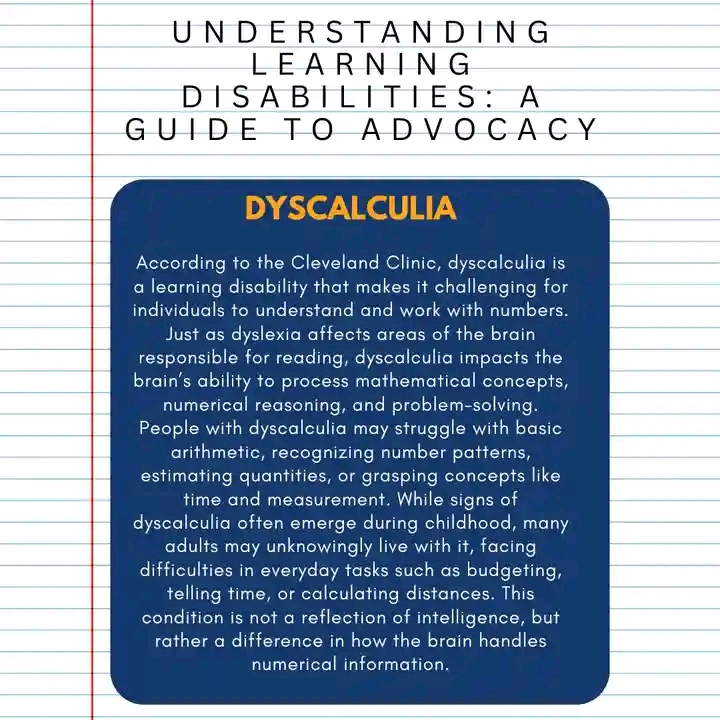Accomodations for learners with learning disabilities
Accomodations for learners with learning disabilities
What are learning disabilities? Description of accomodations that can be put in place for students(any age but in academic setting) with a learning disability.
Learning disabilities refers to a range of neurological disorders that affects individuals ability to acquire, process or use information effectively.Learning disabilities interfere with learning basic skills, reading, writing, mathematics, abstract reasoning and organisation(Jack M,Lynn S,Marcia A,2007). Learning disability is not a problem with intelligence and motivation.Learning disabilities includes Dyslexia, Dysgraphia, Dyspraxia,Dyscalculia and Attention Deficit Hyperactivity Disorder(ADHD).The following learning disabilities,the causes of learning disabilities and accomodations are discussed below:
Dyslexia
Dyslexia is a learning disability that affects reading, spelling and writing.It causes problems with phonological processing and auditory processing.Dyslexia is common among children below ten years of age.This is according to World Health Organisation.It is caused by various factors including genetic factors, environmental factors and brain injuries.Some studies for example Shally Shaywitz in her book "Overcoming Dyslexia"argued that Dyslexia can be inherited;there are language processing genes linked to Dyslexia.Brain injuries for example damage of temporal and occipital lobes interferes with language processing.Environmental factors like teratogenic factors can cause dyslexia.Teratogenic factors refers to environmental factors and conditions that a mother maybe exposed to during pregnancy and they include toxins like alcohol and other drugs and emotions like anger and fear.Ben Foss in his book "Dyslexia Empowerment Plan"explains various accomodations which are needed inorder to assist students in academic settings:
Classroom modifications;Preferential seats majorly the front seats should be left for these students with Dyslexia to improve their engagement levels and continued cooperation in learning.Assistive technology;audio books are recommended so as to aid their understanding of written materials.Much time should be given to handle and do assignments;to give them sufficient time for assignment completion and improvements on the spelling.Use of visual aids;illustrating diagrams and figures for effective understanding.Reduced workload;Reduced assignments and homeworks to give them time to capture the contents learnt.Remedial studies;To reinforce knowledge and enhance content mastery.Psychological counselling;can assist in giving insights and raising self awareness.
Dysgraphia
Dysgraphia is a learning disability which is characterised by deficiency in writing skills especially poor handwriting and disorganisation.It is also referred to transcription disability since individuals with this disability have their handwriting impaired.Students who have the above learning disability tend to mix both lower case and title case,too much erasures, cramping figures,slow writing and often do not write between the lines.The problem is caused by neurological problems like brain injuries,weak memory which makes these students to take long in mastering spellings and deficiency in fine motor skills making their figures to pain when writing(Cherri Dotterer,2018).Cherri Dotterer in her book "Handwriting Brain-Body Disconnect", further suggested various accomodations for students with Dysgraphia.Firstly,reducing written assignments.Instead oral assignments should be given rather than the essays written assignments.
Secondly,fine motor skills training to enhance the flexibility and accuracy of the figures.Thirdly,giving extra time for assignment completion to students with Dysgraphia as this gives them adequate time to arrange their work appropriately.Lastly,psychological counselling and therapies like occupational and physical therapy which serves fundamental roles in helping these students to adapt to day to day lives.
Dyscalculia
Dyscalculia is a learning disability characterised by difficulty in understanding and working with numbers and basic arithmetics and mathematics.These students while in school tend to fail or record minimal grades in mathematics(Brian Butterworth,2018).Dyscalculia is caused by various factors including early childhood experience;if a child is not exposed to basic arithmetics at a younger age or was punished negatively when he or she did not perform well in arithmetics then higher probability to develop Dyscalculia,genetics;it can be passed from a parent to offspring,brain injuries for example damage of cerebrum can interfere with learning.
Brian Butterworth in his book "From Science To Education"illustrated various accomodations for students with Dyscalculia:Use of assistive technology for example integrating calculators in learning to enhance efficient calculations as well as making calculations much easier,remedial studies to enhance arithmetics content mastery,much time should be given to these students to complete assignments since they also have problems with time management skills when handling arithmetics alternative assessments like oral assessments rather than written assignments to improve performance and psychological counselling to enhance self awareness and insights about their disability.
Dyspraxia
Dyspraxia refers to a learning disability which interferes with motor skills and coordination as well as bring effects on cognitive functions for example organisation.It is also called Developmental Coordination Disorder.The problem caused in motor skills makes writing difficult hence affects students writing skills.Dyspraxia is caused by various factors including;genetic factors,it can be passed from the parents to offspring.
Studies argue that there are certain genes that are linked to Dyspraxia,neurological factors for example brain damage like damage of frontal lobe and cerebrum and premature birth which may cause premature development of brain tissues hence causing a learning disability(David Sugden,2005). According to David Sugden in his book "Developmental Coordination Disorder And Its Consequences",he stated various ways of accomodating students with Dyspraxia learning disability and they included:occupational and physical therapy to help these students to cope with their conditions and enable them to adapt to day to day activities,assistive technology for example speech to text software or use of keyboards in learning process,extra time for assignments to enable them catch up with other students,step by step guidance for example in writing for them to improve their capacity and psychological counselling and therapy to raise self awareness.
Attention Deficit Hyperactivity Disorder
It is not a learning disability but it may have impact on learning among students.It is characterised by lack of focus and attention, hyperactivity,lack of emotional regulation and lack of organisation.It is prevalent in children between five to ten years.The real cause of this disorder is unknown but some studies link it to heredity.
Studies show that children with Attention Deficit Hyperactivity Disorder have high probability of developing either one or more of the learning disabilities(Edward M,John J,2010). Children with this disorder can be accomodated in various ways:positive reinforcement to encourage them engage in acceptable behaviour,behaviour intervention plan can be adopted so as to unlearn the unacceptable behaviours and be able to learn and relearn the acceptable behaviours,giving breaks to enable them relax in between lessons,they should be given extra time for homework completion.
Conclusion.
In conclusion,in addressing learning disabilities, early identification is very crucial because it gives a room for earlier accomodation of the learner.For this to be effective,psychologists need to adopt a collaborative approach by working together with teachers, parents and caregivers.
References.
Dotterers,C.L.(2019).Adaptive teaching techniques to unlock a childs dysgraphia for the classroom and at home.Academy Elite.
Sugden,D.A&Chambers,M.E.(2005).Children with developmental coordination disorder.WhurrPublishers.
Butterworth,B.(2018).Dyscalculia.Routledge.
Foss,B.(2013).The Dyslexia empowerment plan.Ballantine Books.
Hallowell,E.M.,Ratey,J.J(1994).Driven to distraction.Pantheon Books.





















